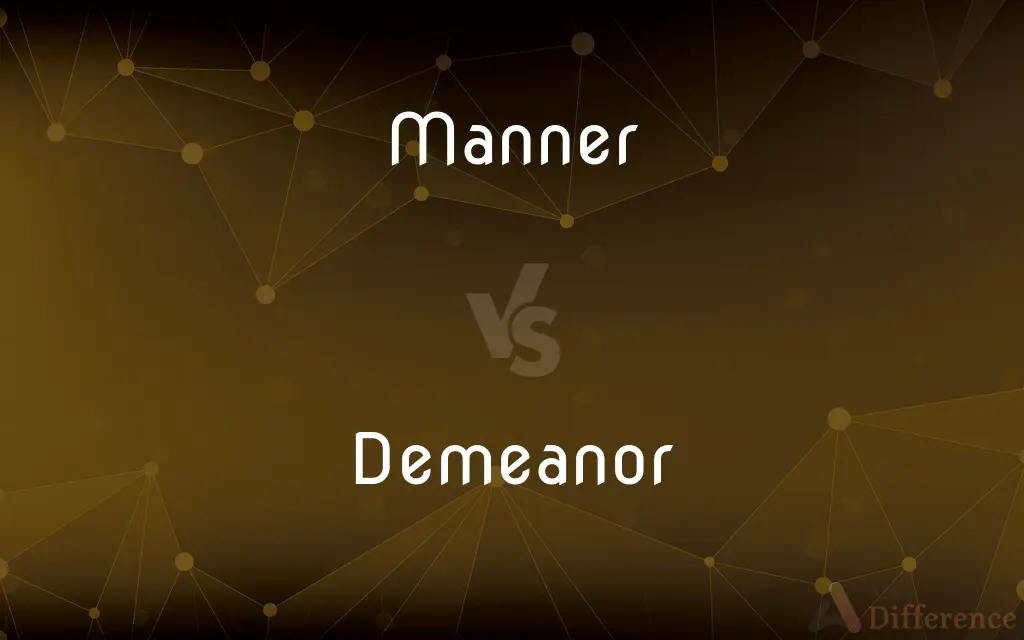Manner vs. Demeanor — What's the Difference?
By Maham Liaqat & Urooj Arif — Updated on April 8, 2024
Manner refers to the way in which something is done or happens, emphasizing method or style, while demeanor focuses on someone's outward behavior or bearing, especially in terms of the impression they make.

Difference Between Manner and Demeanor
Table of Contents
ADVERTISEMENT
Key Differences
Manner often implies a distinctive way of doing something, reflecting individual or cultural styles. For example, someone might have a meticulous manner when performing tasks, indicating precision and care. Demeanor, on the other hand, relates more to the external expression of one's character or mood, such as a calm demeanor suggesting serenity or control in one's outward behavior.
While manners can be taught and often pertain to etiquette or protocol in various situations, suggesting a learned aspect of behavior, demeanor is more innate and reflects one's underlying temperament or disposition. For instance, someone's polite manners can be acquired through education, whereas a gentle demeanor might be a natural part of their personality.
In social interactions, manners play a crucial role in forming impressions and facilitating communication, often governed by societal norms and expectations. Conversely, demeanor can provide insights into a person's emotional state or attitude, influencing perceptions of their personality without words.
Manners are usually specific to actions and practices, such as dining manners or speaking manners, highlighting the procedural aspect of behavior. Demeanor, whereas, encompasses the overall aura or presence of a person, often perceived through non-verbal cues and contributing to the general impression they leave on others.
While manners are often consciously practiced and can be adjusted according to the social context, demeanor is less controllable and more reflective of one's natural state. This distinction underscores the difference between how one chooses to act (manners) versus how one inherently appears or feels (demeanor).
ADVERTISEMENT
Comparison Chart
Definition
The way in which an action is performed or something happens.
The outward behavior or bearing of a person.
Focus
Method or style of action.
Impression made by one's outward behavior.
Teachability
Can be taught and learned.
More innate and reflective of one's character.
Relation to Social Norms
Often governed by societal norms and etiquette.
Influenced by inherent temperament, less by social norms.
Reflection
Reflects cultural or individual style of doing things.
Reflects underlying personality or emotional state.
Compare with Definitions
Manner
A way in which a thing is done or happens.
The chef's manner of chopping vegetables is efficient and precise.
Demeanor
A way a person seems to others based on their behavior.
Despite the crisis, her demeanor remained composed.
Manner
The approach or treatment used in dealing with something.
The teacher's manner of addressing questions is very patient.
Demeanor
The outward behavior or bearing of a person.
His calm demeanor helped to ease the tension in the room.
Manner
Customary behavior in social situations.
His polite manner won her parents' approval.
Demeanor
The way someone conducts themselves publicly.
His professional demeanor at work earns him respect.
Manner
A person's outward bearing or way of behaving towards others.
She has a friendly manner that makes everyone feel welcome.
Demeanor
The emotional state as expressed outwardly.
Her cheerful demeanor brightens up the office.
Manner
Style of artistic expression or execution.
The painting is remarkable for its unique manner.
Demeanor
The general appearance or behavior of someone or something.
The dog’s friendly demeanor makes it a great family pet.
Manner
A way in which a thing is done or happens
Taking notes in an unobtrusive manner
Demeanor
The way in which a person behaves; deportment.
Manner
A person's outward bearing or way of behaving towards others
His arrogance and pompous manner
Demeanor
(American spelling) The social, non-verbal behaviours (such as body language and facial expressions) that are characteristic of a person.
The man's demeanor made others suspicious of his intentions.
A confident demeanor is crucial for persuading others.
Manner
Polite or well-bred social behaviour
Didn't your mother teach you any manners?
Demeanor
Management; treatment; conduct.
God commits the managing so great a trust . . . wholly to the demeanor of every grown man.
Manner
A way of doing something or the way in which a thing is done or happens
Prepared for the trip in a very organized manner.
Demeanor
Behavior; deportment; carriage; bearing; mien.
His demeanor was singularly pleasing.
The men, as usual, liked her artless kindness and simple refined demeanor.
Manner
A way of acting; bearing or behavior
He is known for his reserved manner.
Demeanor
(behavioral attributes) the way a person behaves toward other people
Manner
The socially correct way of acting; etiquette
Had trouble mastering manners in his new country.
Manner
The prevailing customs, social conduct, and norms of a specific society, period, or group, especially as the subject of a literary work
A novel of 18th-century manners.
Manner
Practice, style, execution, or method in the arts
This fresco is typical of the painter's early manner.
Manner
Kind; sort
What manner of person is she?.
Manner
Kinds; sorts
Saw all manner of people at the mall.
Manner
Mode of action; way of performing or doing anything
Manner
Characteristic mode of acting or behaving; bearing
His natural manner makes him seem like the boss.
Manner
One's customary method of acting; habit.
These people have strange manners.
Manner
Good, polite behaviour.
Manner
The style of writing or thought of an author; the characteristic peculiarity of an artist.
Manner
A certain degree or measure.
It is in a manner done already.
Manner
Sort; kind; style.
All manner of persons participate.
Manner
Standards of conduct cultured and product of mind.
Manner
Mode of action; way of performing or effecting anything; method; style; form; fashion.
The nations which thou hast removed, and placed in the cities of Samaria, know not the manner of the God of the land.
The temptations of prosperity insinuate themselves after a gentle, but very powerful, manner.
Manner
Characteristic mode of acting, conducting, carrying one's self, or the like; bearing; habitual style.
Paul, as his manner was, went in unto them.
Air and manner are more expressive than words.
Manner
Carriage; behavior; deportment; also, becoming behavior; well-bred carriage and address; as, mind your manners!.
Good manners are made up of petty sacrifices.
Manner
Certain degree or measure; as, it is in a manner done already.
The bread is in a manner common.
Manner
The style of writing or thought of an author; characteristic peculiarity of an artist.
Manner
Sort; kind; style; - in this application sometimes having the sense of a plural, sorts or kinds; as, all manners of people came to the rally.
And they being afraid wondered, saying to one another, What manner of man is this! for he commandeth even the winds and the water, and they obey him.
Ye tithe mint, and rue, and all manner of herbs.
I bid thee say,What manner of man art thou?
Manner
How something is done or how it happens;
Her dignified manner
His rapid manner of talking
Their nomadic mode of existence
In the characteristic New York style
A lonely way of life
In an abrasive fashion
Manner
A way of acting or behaving
Manner
A kind;
What manner of man are you?
Common Curiosities
How does demeanor differ from manner?
Demeanor is more about the outward behavior or the impression one’s behavior gives, reflecting underlying temperament rather than the method of action.
Do manners only apply to social interactions?
While manners are often emphasized in social interactions, they can apply to any action or way of doing things.
Is demeanor innate?
Demeanor tends to be more innate, reflecting a person's natural disposition or emotional state.
Can manners be learned?
Yes, manners can be taught and learned, often relating to societal norms and etiquette.
Can someone's demeanor change?
While demeanor is more innate, it can change due to personal growth, experiences, or effort to modify one's outward behavior.
What is manner?
Manner refers to the way in which something is done or the approach taken, often highlighting the style or method.
How does one's demeanor influence first impressions?
Demeanor significantly influences first impressions, as it is one of the first things noticed in social interactions, affecting perceptions of approachability and personality.
Does demeanor always reflect one's true feelings?
Not always. Someone can project a certain demeanor intentionally, which might not reflect their true emotions or state of mind.
How can one improve their manners?
Improving manners often involves learning and practicing social norms, etiquette, and respectful behavior towards others.
Are manners important in all cultures?
Yes, manners are considered important across different cultures, though the specifics of what is considered polite can vary widely.
Can demeanor be misinterpreted?
Yes, a person's demeanor can be misinterpreted, especially if cultural differences or personal biases affect the observer’s perception.
Is demeanor linked to personality?
Yes, demeanor is closely linked to one's personality, as it reflects underlying character traits and dispositions.
Can poor manners affect relationships?
Absolutely. Poor manners can negatively impact social and professional relationships, affecting how others perceive and interact with a person.
Are there professions where manners are more critical?
Manners are particularly critical in service-oriented professions and roles that involve frequent interpersonal interactions.
Why is understanding the difference between manner and demeanor important?
Understanding the difference helps in accurately interpreting others' behaviors and in self-awareness of one’s own actions and their impact.
Share Your Discovery

Previous Comparison
Precipitate vs. Precipitant
Next Comparison
Mailer vs. AddresseeAuthor Spotlight
Written by
Maham LiaqatCo-written by
Urooj ArifUrooj is a skilled content writer at Ask Difference, known for her exceptional ability to simplify complex topics into engaging and informative content. With a passion for research and a flair for clear, concise writing, she consistently delivers articles that resonate with our diverse audience.
















































